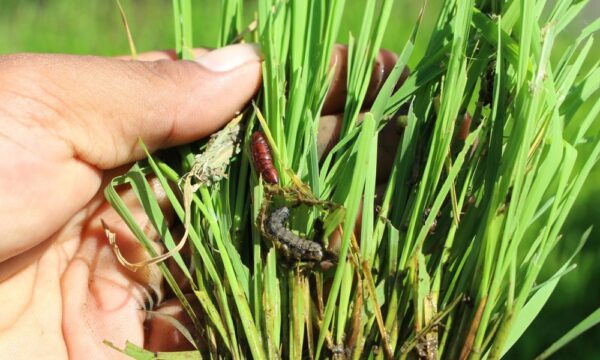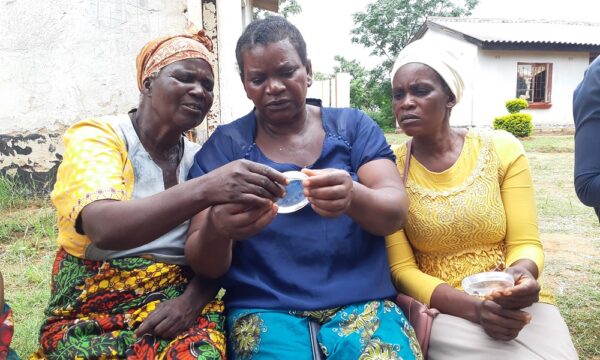
First reported in Africa in September 2016, fall armyworm (Spodoptera frugiperda) is now present in most sub-Saharan countries, where severe damage in maize fields has been observed. Kenya is one the countries that has not been spared the wrath of this invasive pest. Since it was first reported in Kenya’s western region (Trans Nzoia, Busia, and Bungoma counties) in March 2017, it has spread to 42 counties including the major seed and maize production areas of the Rift valley, coastal, and western regions.
In response to the crisis, the Kenyan government supplied farmers with pesticides. Many frustrated farmers, however, are experimenting with other traditional solutions to fight the armyworm, a phenomenon called “citizen science”. This is a contribution by the farmers of their time, energy, and skills to research, which they actively undertake with thoughtful action on their part, increasing their scientific understanding in the process, and subsequently generating useful observations that can be validated further with scientifically designed experiments. These traditional methods have reportedly proven to be effective in some parts of Kenya and across Africa. But what are these methods and do they really work?
CABI has recently been conducting socio-economic surveys on fall armyworm, and found that some farmers are deploying a range of traditional methods against this invasive pest. It’s interesting how farmers can innovate in the face of a crisis such as fall armyworm.
Fridah Kavetsa is a maize farmer at Mushiega Village in Vihiga County. After planting maize in her 2-acre farm in 2017, she noticed a strange worm that was destroying her maize faster than other armyworms. As she has always done to deal with such pests, she prepared ash and chilli powder, which she sprinkled on the maize funnel. After several applications, she noticed the pest had disappeared. Other farmers in the village had resorted to using paraffin and detergents in a desperate attempt to control the pest, but have reported better results using wood ash and chilli powder.
Farmers in Western Kenya have also discovered that neem and pyrethrum can reduce fall armyworm populations. Neem is known to be an antifeedant, meaning that the pest is unable to feed on the target crop. Neem also interferes with the pest’s ability to lay eggs. On the other hand, the white flowers in pyrethrum have active ingredients called pyrethrin. Farmers who opt to use pyrethrum pick the flowers on a warm day, when they are open, dry and store them in an airtight container in the dark (light reduces the effectiveness of the flowers). Later the dried flower is ground into powder and sprinkled in the leaf funnel.
In another location at Gatateri, Mbuvoni, women have been using a concoction of red pepper, ash and tobacco to tame the pest. The majority of the 23 members of Mwirutiri Self Help Group have experimented with the method and claim it has worked well on their maize crop. Dorothy Nyaguthii, the group’s chairperson, said they used firewood to cook, which gave them enough ash and got red pepper from their farms. The tobacco is sourced from local markets at KES10 (US$ 10 cents) for the smallest pack. “We collect the cooled off ash and sieve the debris. For every two 2kg container of ash, we mix two teaspoons of red pepper and three teaspoons of tobacco,” she said.
Ms Nyaguthii says when the armyworms come in contact with the red pepper, it causes a burning sensation that kills them. She believes the ash emits a smell that attracts the pest to come and feed, the red pepper kills them, and the tobacco enables the mixture to stick on the maize plant. The concoction is also believed to adversely affect the ability of fall armyworm to lay eggs.

Jacqueline Wamuyu (left) explains to a farmer Alice Muthambure in Tharaka how fall armyworms invade plants. Ms Muthambure is among the farmers who have sprayed homemade pesticides to fight the armyworm (photo credit: Jacinta Mutura, Standard Newspaper Kenya)
Similarly at Kericho, farmers resorted to spraying their crop with washing powder in a desperate attempt to kill the dreaded armyworms. Mr Samuel Sigei, a farmer at Kipsitet, Soin Sigowet sub-county said that having used four different pesticides without success, he was advised by fellow farmers to dilute powder soap and spray that on the plants instead. “I am seeing it working. The attack is minimal on my side compared to the neighbouring farms,” he noted.
Mr Sigei mixes 25 grams of the detergent in 20 litres of water and sprays it on a one acre farm. “I have done my own experiments to prove the effectiveness of the soap powder compared to locally available pesticides. I took a pinch of it, diluted it in some water and dropped the worms in for about seven seconds. Once you remove the pests, they die within seconds,” he said in a report that was published by the Business Daily.

Fall armyworm has been causing devastation to crops, particularly maize, across Africa.
This wave of citizen science attempting local solutions against fall armyworm is not just unique to Kenya. In Malawi, according to a report by Reuters, farmers are using home-made remedies to control the armyworms. Jessy and James Kanjala live in Mulanje district, about 60 km east of the commercial capital, Blantyre. The couple say they have been able to repel an invasion of armyworms on their three-acre farm with a solution of water, pounded chilli pepper and salt. The Kanjalas have been pouring the repellent on crops for about a year now.
“With this local concoction the fall armyworms are dying instantly. As such, if all the farming families were to adopt this local pesticide, we can rescue the remaining crop in the field and in doing so farmers would have some harvest,” said James.
“As farmers we realized quite late that the worms had become resistant to scientifically proven pesticides. But those of us that have applied this locally-made concoction have managed to save our crop. Maybe if we had discovered this method much earlier, more of the crop would have been saved,” added Jessy.
Samson Muhoye, another farmer in Mulanje has also found a remedy. He uses a detergent and salt solution to repel the worms. Muhoye says the solution is proving to be very effective. “When this pest affected my crop last year I had no idea which pesticide would be effective. I lost almost all my crop. This year I have saved a lot of it and I think if Malawians adopt this method, surely, they will harvest something,” he reported.
Tumu farmers in Ghana are also using detergents. They started using washing powder and mixing it with pepper to spray their farms, and it is working, saying that in fact the detergent is more effective than the chemicals supplied by the government.
Such citizen science may have the potential to contribute to identifying locally adaptable solutions for the management of fall armyworm. Scientists should not dismiss farmers’ experiments, but they should conduct their own research to understand more about any underlying mechanisms behind the reported effectiveness of these methods. Farmers as well as scientists have a part to play in research on fall armyworm.
Winnie Nunda is an Invasive Species Assistant at CABI Africa
4 Comments
Leave a Reply
Related News & Blogs
Revolutionizing crop protection: Success of a novel approach to combatting fall armyworm in India
The global battle against invasive pests has found a new champion with pioneering efforts to combat the fall armyworm (Spodoptera frugiperda) in India. This is thanks to a sensor-based pheromone trap – that can be operated remotely anywhere in the worl…
18 August 2023





[…] Citizen Scientists attempt traditional solutions against fall armywormIn “Agriculture” […]
[…] to control fall armyworm, feeling that it is the most effective method. Some farmers also use cultural methods such as early planting, applying ash, boom, neem or sand, and handpicking. However, the […]
[…] Citizen Scientists attempt traditional solutions against fall armyworm […]
[…] Citizen Scientists attempt traditional solutions against fall armyworm […]